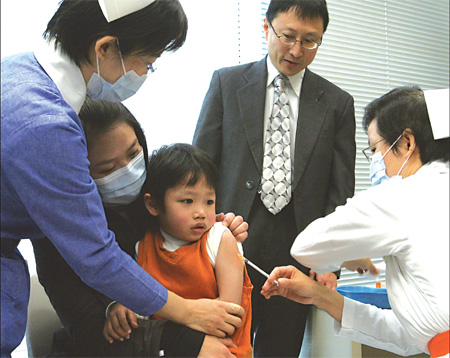Flu vaccine begins for high risk groups
Updated: 2009-12-22 07:35
By Phoebe Cheng(HK Edition)
|
|||||||||
|
Controller of the Centre for Health Protection Thomas Tsang observes the implementation of the human swine flu vaccination program at the Western Student Health Service Centre yesterday. China Daily |
HONG KONG: Amid predictions that the onset of the winter flu season would come six to ten weeks earlier than normal, the city's ambitious human swine flu vaccination program started yesterday.
Public response to the free vaccines, however, was viewed as lukewarm to moderate. More than 1,500 got their shots on the first day.
Centre for Health Protection controller Thomas Tsang Ho-fai predicted that the second wave of seasonal flu will come earlier than normal. "There is a possibility the flu season may come in the next couple of weeks. We look at other countries like the States, Canada and the UK. This year their flu season actually started earlier, about six to 10 week earlier, so there is a chance that we may enter the flu season some time perhaps next month or in February," said Tsang.
He added that it takes at least two weeks for vaccine recipients to acquire the necessary immunity needed to stop the virus. Thus he urged people in the five groups considered at highest risk to have the vaccine as soon as possible.
Mrs Yuki Solomon took her 2-year-old son to be vaccinated on the first day at the Western Student Health Service Centre, one of the 12 Student Health Service Centres (SHSCs). She said she wanted to make sure that her son was protected against the H1N1 virus.
"They (the government) are very careful to organize everything but they are too careful," said Mrs Solomon. "They might be able to do it a little bit quicker because the other countries are already finished at the stage."
She said she was aware the risk associated with taking the human swine flu vaccine is about the same as that risk of taking the seasonal flu vaccination. She said she's never hesitated to get the seasonal flu vaccination so she has no concerns about the H1N1 vaccine.
Mr Ng's two daughters, aged four-and-a-half and one-and-a-half, also got their shots. The family is bound for Britain to spend the Christmas holiday. Ng made the appointment for the vaccination a week earlier but believed it already was too late, since other countries implemented their vaccination programs a month ago.
Starting next Monday, chronic patients and pregnant women, children aged six months to six years, seniors aged 65 and above, and healthcare workers can get swine flu jabs at registered private clinics under a government subsidy of HK$129 a dose. Workers who work with live hogs are also eligible. They can be vaccinated at the Hospital Authority's designated general outpatient clinics.
Acting Secretary for Food & Health Gabriel Leung urged private doctors to give priority to people in high-risk groups, as outlined in the vaccination guidelines for private doctors.
"People outside the five high-risk groups will not be subsidized," said Leung. ""We have a system to monitor the use and we would be able to tell the proportion allocated. In serious violation cases, clinics could have their contracts terminated.
Research done by the University of Hong Kong has found that anti-viral drugs are only effective in dealing with mild forms of the H1N1 flu.
"In the serious cases of human swine influenza, there is a delay in the control of the viral load, which, when compared to mild cases, decreases much more slowly despite all the anti-viral therapies that are given," said Yuen Kwok-yung, the head of the University's Microbiology Department. "So in some ways anti-virus therapy is not very effective. At present it is not the ideal treatment for severe cases of human swine flu."
In order to promote the benefits of the human swine flu vaccine, the government plans to increase publicity. Despite all efforts aimed at emphasizing the importance of the vaccine, some remain doubtful.
"I'm not going to take my child for the vaccination," said Mrs Cheng who has a 5-year-old child. "I don't see there is such a need to take the vaccine. I think the situation is not that serious."
(HK Edition 12/22/2009 page1)
